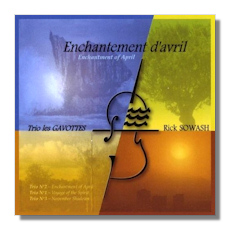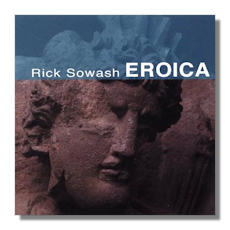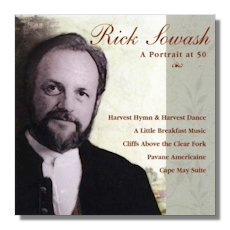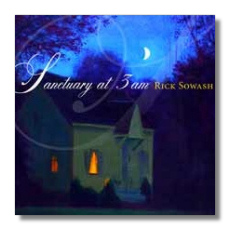
The Internet's Premier Classical Music Source
Related Links
- Sowash Reviews
- Latest Reviews
- More Reviews
-
By Composer
-
Collections
DVD & Blu-ray
Books
Concert Reviews
Articles/Interviews
Software
Audio
Search Amazon
Recommended Links
Site News
 CD Review
CD Review
Rick Sowash

Enchantement d'avril
- Clarinet Trio #2 "Enchantement d'avril"
- Clarinet Trio #1 "Voyage de l'esprit"
- Clarinet Trio #3 "Ombres de novembre"
Les Gavottes
TT 53:07


Eroica
- Sunny Days
- Convivial Suite
- Impressionist Suite #1
- Piano Trio #5 "Eroica"
Paul Patterson, violin
Anthony Costa, clarinet
Phil Amalong, piano
Laura Bossert, violin
Terry King, cello
Mark Ostoich, oboe
Ron Aufmann, clarinet
Mark Ortwein, bassoon
TT 71:51


A Portrait at 50
- Harvest Hymn & Harvest Dance: Homage to Willa Cather
- A Little Breakfast Music
- The Cliffs above the Clear Fork
- Une Pavane Americaine: Homage à Ravel
- Cape May Suite
Terry King, cello
John Jensen & Phil Amalong, piano
Barb Sink, flute
West End Chamber Ensemble
TT 66:42


Sanctuary at 3 AM
- Sanctuary at 3 AM
- Lullabye for Kara
- Variations on a Hiking Song
- Impressionist Suite #2
- The View from Carew
Anthony Costa & Ron Aufmann, clarinet
Phil Amalong, piano
Jeff Schoyen, cello
Mark Ostoich, oboe
Mark Ortwein, bassoon
TT 52:45
[All selections available from the composer at www.sowash.com]
Summary for the Busy Executive: Franco-American.
Composing has become an occupation of hermits, the refuge of amateurs. The United States alone could claim thousands of composers, if only Americans, even interested Americans, knew the names. I refer to composers professionally trained, rather than to the home hobbyist or the self-convinced genius (often one and the same). We tend to know the lucky – luckier, indeed (because so few) than those who have won millions of dollars on a lottery ticket. A composer of classical music can secure a living or even performances only with difficulty, so the tendency is to grub away in isolation, writing to satisfy, not a consumer, but an inner need. The problem is that, contrary to our Romantic illusions of the solitary mastermind, great things are seldom achieved in total social isolation. If you look at the great periods in art – Paris, Berlin, Vienna, and London in the early part of the Twentieth Century, Elizabethan drama, London and St. Petersburg throughout the Nineteenth Century, New York in the Thirties and Fifties, even the Transcendentalists' Concord – you hear poets, painters, and composers talking to one another, fighting, admiring, and changing because of the contact.
Rick Sowash lives in Ohio. I've actually heard his music before this: a choral piece called "Philosophical Anecdotes" on a wonderful CD led by Gregg Smith (Songs of Humor & Satire on Premier PRCD1030, nla), which sets anecdotes about the Cynic philosopher Diogenes – a score of wit and genuine humor. Sowash has never made or sought to make a living as a composer, either in commercial or in academic contexts. He's written books on Ohio folkways, managed a theater, worked for a radio station, and at one point served in public office as a commissioner for Richland county, in the north-central part of the state. Indeed, Sowash makes a point of his outsider status and takes as his career, if not his musical model Charles Ives. But, then again, as I've tried to point out, most American composers are outsiders.
More important than any of this, of course, is the music Sowash writes. I liked some pieces very much and some better than others. In fact, a couple I found a little weak, for reasons I'll talk about below. However, what struck me immediately about Sowash's music is its "authenticity." The music seems to express a real person and address the lives most of us lead, rather than to scale mountains with the goal of reaching God. The tone of a lot of it is what I've taken to calling American Common Sense – incidentally, not all that common. It's usually adopted by somebody really brilliant, who's trying to fly in under the ever-vigilant anti-intellectual radar: Robert Frost playing at the simple New England Farmer, Gertrude Stein writing the dazzler of a sentence, "America is my country, but Paris is my home town," the temperance of William James. It's a strategy almost exclusively confined to the U.S. Europe, by contrast, seems to favor obscurantists, although the British sometimes come up with a similar type, like Chesterton or Shaw, who tries to make even the most outrageous things sound reasonable. Since I'm from Ohio myself, I associate the type most strongly with the Midwest and with poets like William Stafford and Jared Carter. Sowash seems to find the music for that tone of voice. It has a modesty, ingrained rather than put on. Musically, I'd compare it mainly to French composers like Françaix and Poulenc, although Sowash lacks Françaix's love of clockwork artifice and Poulenc's unashamed religious grandeur.
The clarinet trios, written for Les Gavottes, give Sowash at his best. The second trio, subtitled "Enchantement d'avril," originated as a group of songs Sowash wrote for a friend. Apparently, a lot of Sowash's music gets produced for friends or with friends in mind. Indeed, this set of trios was probably written for Lucien Aubert, clarinetist of Les Gavottes and another Sowash friend. Opening with some Poulenc-y chords, the first movement sings, in a very direct way, of the awakening of Spring. Sowash may follow some classical structure. However, the melodies so consistently seduce me, that my analytical listening goes to hell. Like the American composer Jerome Moross, Sowash's music gives the impression of "just song." It's not, of course, since the textures often spring from imitative counterpoint, yet without calling attention to themselves as such. The craft, though important, remains secondary in my mind. I react to Sowash's work mainly on how well I like the tunes. The ones in the clarinet trios stand out. In the liner notes, the composer tells us of his state of mind in composing the works. The music may be modest, but the composer has invested some Big Ideas – spiritual journeys to God and Certainty, and so on. But this isn't Bruckner. It's not that Sowash's music can't express such things, but that it does so on a human, rather than on a titanic scale. Furthermore, if you don't read the composer's comments, those ideas wouldn't come to you, at least not immediately.
Sunny Days, written for a violin-clarinet-piano trio about to tour Byelorussia, sets four of the region's folk songs. It sounds to me in the line of Prokofieff's Quintet, though lighter in heart. The Convivial Suite counts as one of my favorite Sowash works. A violin-cello duet, Sowash wrote it for two couple friends who played those instruments. One couple, violinist Laura Bossert and cellist Terry King, play it on the CD. It's a little suite in d-minor, an odd key for conviviality, but it mostly lives up to its billing. It also talks of romance, in a paradoxically grand, sweeping waltz for the two instruments. The variety of mood and texture throughout – a march, a blues, a brief adagio of surprising weight, a "zany" (to quote the composer) finale, and so on – impress me greatly.
The two Impressionist Suites – for oboe, clarinet, and bassoon – began life as one. Sowash thought the work too long and so split it in two. I think of the first suite as Famous Impressionists (Monet, Renoir, Manet) and of the second as Not-so-famous Impressionists (Cassatt, Caillebotte, Sisley & Bazille). I prefer the second suite to the first (especially the 3-part canon of the Caillebotte movement, "Precision"), although I love the Renoir movement, subtitled "the play of colors," where often only one instrument sounds at a time. Yet the little piece remains seamless.
Although Sowash's music may appear simple, the fifth piano trio, "Eroica," shows exactly how hard his style is to work with. He wrote with the death of his father, twenty years earlier, in mind. Undoubtedly, he wanted to write a "big" piece, something to honor his father. Unfortunately, I can't call it a success. A lot of it just goes by me. To work, Sowash's music in general seems to need a wonderful idea. The style is so direct, that he can't cover up with a lot of notes or rely on manner alone. Sanctuary at 3 AM has the same problem – great ambition which adds up musically to little. Sowash's program notes talk of personal sanctuary, as well as the "sanctuary" of tonality, whatever that may mean. Does he think Schoenberg and Berg will beat him up? But if the music had caught fire, I doubt I would have objected to the note.
Yet Sowash does bring off big things. The Harvest Hymn and Harvest Dance for cello and piano has a stark, Romantic, yet human-scale dignity. To some extent, it echoes Henry Cowell's series of "hymns and fuguing tunes." A Little Breakfast Music (an obvious bow to Mozart here) and the Cape May Suite show a fine wit and a vein of real poetry. A Little Breakfast Music – for oboe, clarinet, and two violins – manages nearly twenty-five minutes without a true bass instrument. Sowash's solutions are elegant, especially because you really don't sense a stunt. Again, it's a piece written for a bunch of friends who happened to play those instruments. Cape May – a little more conventional in its scoring – I take as an homage to Sowash's marriage. The composer and his wife vacation there.
The performers – especially Les Gavottes, cellist Terry King, and pianist Phil Amalong – play this music like they love it. If you're in such a mood that you just don't want to have to soar with Mahler, you might give these discs a try.
Copyright © 2004, Steve Schwartz



















